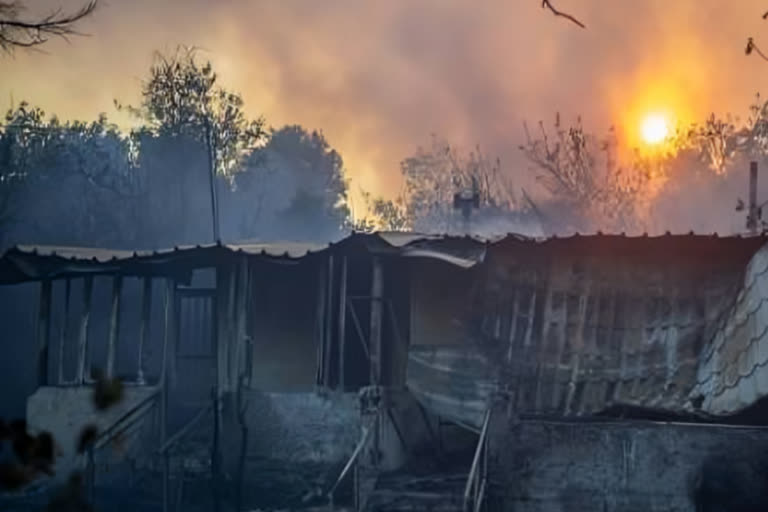Climate Change Kuwait is no longer a distant concern — it’s a daily reality. The desert nation, already known for extreme summers, is now facing unprecedented heatwaves that are pushing human survival, health, and the economy to dangerous limits.
In recent years, Kuwait has recorded some of the hottest temperatures on Earth, often crossing 50°C (122°F) during summer. What once felt like rare spikes in weather patterns are now becoming the new normal. Experts warn that if left unchecked, climate change could become Kuwait’s silent killer, threatening lives, disrupting communities, and endangering future generations.
Heatwaves in Kuwait: A Deadly Trend
Rising Temperatures
Kuwait has consistently ranked among the hottest countries worldwide. In June 2021, a temperature of 53.2°C (127.8°F) was reported in Nuwaiseeb, making global headlines. Such extremes are not just uncomfortable — they are dangerous to human survival.
Health Impacts
- Heatstroke cases surge during peak summers, especially among outdoor workers.
- Children and the elderly face increased risks of dehydration and respiratory problems.
- Hospitals see a sharp rise in admissions linked to heat-related illnesses every summer.
Economic Toll
The intense heat is crippling productivity, particularly in sectors like:
- Construction and oil industries, where outdoor labor is unavoidable.
- Power generation, as electricity demand soars for air conditioning.
- Water resources, strained by desalination plants working overtime to meet demand.
Why Climate Change Kuwait Deserves Global Attention
Climate change in Kuwait is not an isolated problem. As part of the Gulf region, the country plays a critical role in global energy markets and regional stability. Rising temperatures threaten to:
- Disrupt oil production by forcing shutdowns during extreme heat.
- Increase water scarcity, making Kuwait more dependent on costly desalination.
- Trigger migration pressures, as some areas may become uninhabitable.
Scientists warn that if global emissions are not reduced, Kuwait could face “unlivable summers” by 2100, with daily temperatures beyond the human threshold for outdoor activity.

Government Response: Steps Towards a Sustainable Future
National Climate Strategy
Kuwait has pledged to reduce greenhouse gas emissions and has joined international agreements like the Paris Climate Accord. The country aims to diversify its economy away from oil, but progress remains gradual.
Renewable Energy Push
Efforts are underway to invest in:
- Solar farms, taking advantage of Kuwait’s abundant sunlight.
- Energy-efficient buildings, designed to reduce cooling demands.
- Electric vehicles (EVs), with early steps toward adoption.
Public Awareness Campaigns
The government and NGOs are working to educate citizens about:
- Conserving energy during peak hours.
- Reducing plastic and waste.
- Supporting sustainable lifestyles.
Lives on the Line: Voices from Kuwait
Outdoor Workers
For thousands of migrant workers, particularly in construction, the summer heat is life-threatening. Despite midday work bans, many report being forced to work under dangerous conditions to meet deadlines.
Families and Communities
Households spend most of their income on electricity bills during summer months. Families with elderly members and small children worry about prolonged power cuts during heatwaves.
Youth Activists
Kuwaiti youth are raising their voices through climate campaigns, social media, and regional summits, urging faster government action and stronger investment in renewable energy.
Climate Change Kuwait: The Silent Killer in Disguise
While heatwaves are visible, the “silent” impacts of climate change in Kuwait often go unnoticed:
- Mental health stress caused by prolonged indoor confinement during extreme heat.
- Food insecurity, as agriculture becomes nearly impossible under rising temperatures.
- Public health risks, with diseases spreading faster in warmer environments.
The phrase “silent killer” is not an exaggeration — Kuwait is already witnessing deaths linked to heat-related illnesses every year. Without urgent intervention, these numbers are expected to climb.
What Can Be Done?
Policy Recommendations
- Strengthen heatwave preparedness by improving healthcare facilities.
- Expand renewable energy projects to reduce dependence on fossil fuels.
- Adopt smart urban planning with green spaces and heat-resistant infrastructure.
- Protect vulnerable groups, including workers, the elderly, and children.
Citizen Action
- Use energy responsibly.
- Support eco-friendly products.
- Advocate for stricter climate policies.
International Collaboration
As a wealthy nation, Kuwait has the financial means to lead regional climate adaptation efforts. Partnering with neighbors like Saudi Arabia and the UAE could accelerate the Gulf’s transition to sustainability.
The Road Ahead
Climate Change Kuwait is a crisis that cannot be ignored. The record-breaking heatwaves are a warning sign of a hotter, harsher future. But they are also an opportunity — an urgent call for Kuwait to accelerate its green transition and invest in a climate-resilient economy.
Kuwait has the resources, talent, and innovation to transform from an oil-dependent nation into a regional leader in renewable energy and sustainability. The question is — will action come fast enough to protect its people from the silent killer of climate change?
Do follow us: Instagram
Read More: Breathtaking Dubai and UAE Photos That Will Steal Your Heart



